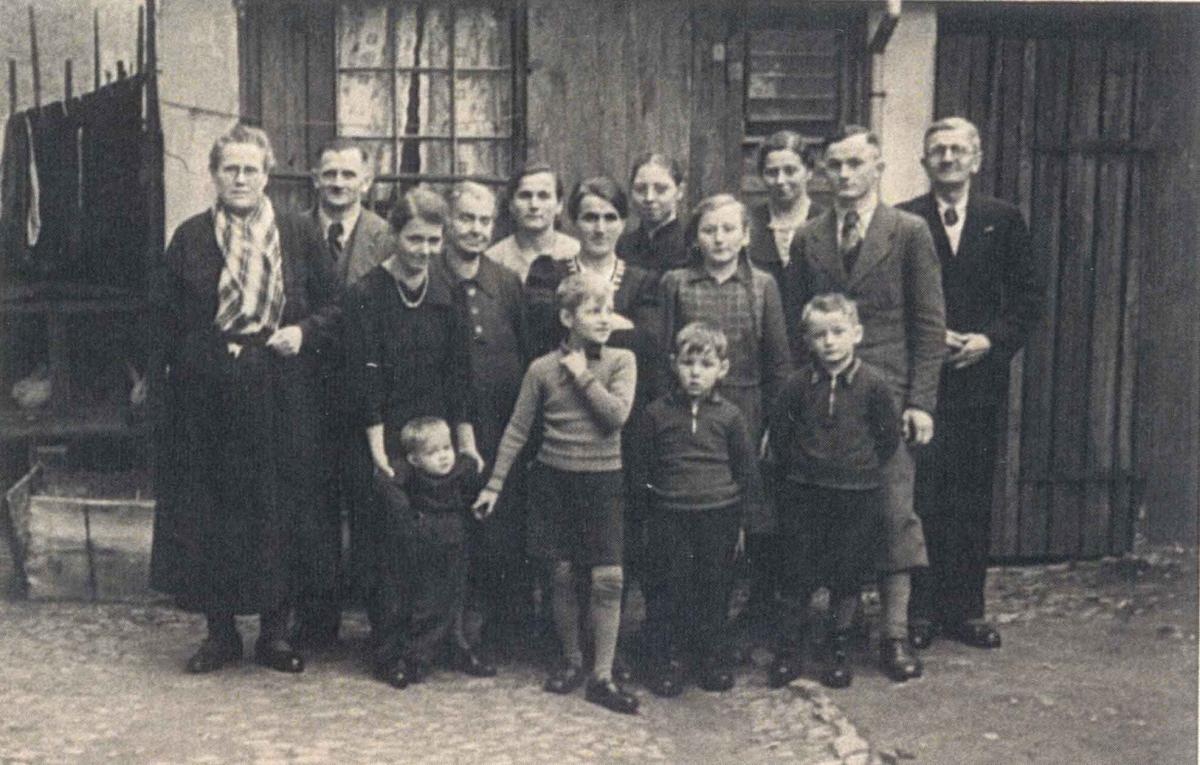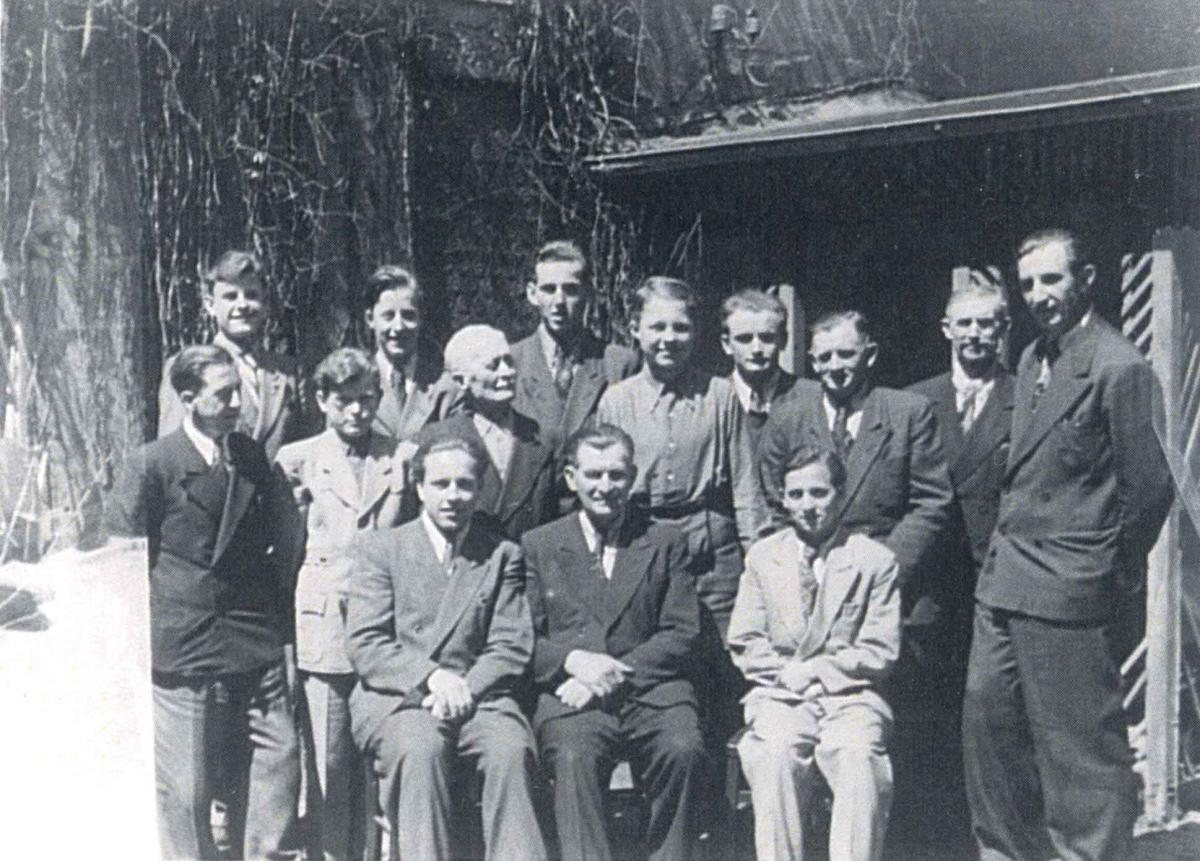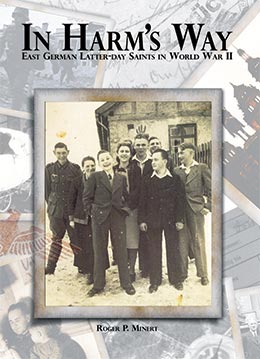Döbeln Branch, Chemnitz District
Roger P. Minert, In Harm’s Way: East German Latter-day Saints in World War II (Provo, UT: Religious Studies Center, Brigham Young University, 2009), 190-2.
Döbeln Branch, Chemnitz District
Located twenty miles north-northeast of Chemnitz, the city of Döbeln had a population of approximately 21,000 when World War II began in 1939. The branch of Latter-day Saints in that town was very small, numbering only nineteen persons, thirteen of whom were adult women.
| Döbeln Branch[1] | 1939 |
| Elders | 0 |
| Priests | 1 |
| Teachers | 0 |
| Deacons | 0 |
| Other Adult Males | 4 |
| Adult Females | 13 |
| Male Children | 1 |
| Female Children | 0 |
| Total | 19 |
The Döbeln Branch held its meetings at Burgstrasse 15, in the first Hinterhaus, main floor. Young Fritz Wächtler (born 1936) later described the setting:
It was right among the businesses in Döbeln. We went to a short alleyway, and our meetinghouse was in the [Hinterhaus]. . . . I believe we had three rooms, [the largest being] a sacrament [meeting] room that was also used as a Sunday School room.[2]
Sunday School began at ten o’clock and sacrament meeting took place in the afternoon. Fritz estimated the typical attendance at thirty members. As in most branches in the East German Mission, a number of friends also attended.
According to Fritz Wächtler, “Dad was a member of the party, but he didn’t participate in any of the activities because he was working in agriculture. He was busy all day long. He didn’t have time for government meetings.” Johannes Wächtler was the branch president in Döbeln for many years. At one point, he was drafted and in uniform, but for only one week. His employer, an elderly man with a very large farm, appealed to the Wehrmacht and was successful in having Brother Wächtler classified as an indispensable agricultural employee. Thanks to his employer’s intervention, Johannes Wächtler was fortunate to remain home for the duration of the war.
Rudolf Wächtler was not quite seventeen years of age in the summer of 1940, when he was approached by Karl Göckeritz, the president of the Chemnitz District and asked if he would be willing to serve a mission. As Rudolf later wrote:
I said that I would have to talk with my father first. He responded that he had already done that and that I had my father’s full support. I asked if I might have a week to consider the matter, and he said that he would ask me again in one week.[3]
On his way home—a distance of about six miles—Rudolf talked with his father and came to the conclusion that he would serve a mission. The call came from Berlin just after his seventeenth birthday.
Rudolf was ordained a priest when he received his mission call. He joined Richard Deus, a traveling elder, on December 4, 1940. They worked together in Zwickau for a month, in Plauen for three months, and in Naumburg for two months. While there, Brother Deus received his draft notice and went home to Breslau.[4] Rudolf Wächtler was then transferred to Demmin in Pomerania (north of Berlin). No other men were called into missionary service, so Rudolf worked alone. His mission lasted only until August 1941, when he was inducted into the Reichsarbeitsdienst and released as a full-time missionary.
 Members of the Döbeln Branch in 1940 (F. Wächtler)
Members of the Döbeln Branch in 1940 (F. Wächtler)
In 1943, Hyrum Cieslak (born 1930) of Chemnitz was sent by his parents to live on a farm in Rittmitz. He joined the Wächtler family in attending church in the Döbeln branch and felt very much at home there. Soon he was asked to work with the Aaronic Priesthood boys.[5]
With the farmwork hindered by the severe shortage of male laborers, the Wächtler boys were often taken out of school and put to work in the fields. “We each had a team of oxen,” Fritz later explained. “We went out in the field and helped out on the farm.”
Apparently the Döbeln Branch moved to different rooms during the war because Hyrum Cieslak clearly remembered a different setting:
We met in the Bäckerstrasse 12. Johannes Wächtler was our branch president. We met in one of the houses in the back. In the front building we had a small room for the Primary. Then we had to walk up the stairs to reach our main meeting room. We had a beautiful podium, an organ, and there may have been some pictures on the wall. . . . There were about twenty-five to thirty people in attendance.
During the final year of the war, refugees from eastern Germany (primarily the province of Silesia) began to stream through the Döbeln community. According to Fritz Wächtler, “We had to shorten our living space. We’d share with other people. Sometimes the kitchen had to be shared.”
 Priesthood holders of the Chemnitz District met in Döbeln during the war (F. Wächtler)
Priesthood holders of the Chemnitz District met in Döbeln during the war (F. Wächtler)
On May 6, the arrival of the Red Army appeared imminent, so Johannes Wächtler prepared his family to flee. Fritz later described the situation:
We loaded a wagon up, with a team of oxen, all ready to go. We packed all night. . . . [The next morning] we started off, heading for the next town [west]. We got there and they said, “Go back! The Russians are here!” When we went back, we found out that [the Russians] had been watching us all night as we packed up. So we were actually surrounded. That was the day before the war ended. . . . So we just turned around and went back to our home.
By the time the excitement of war had subsided, the Wächtlers found themselves living in a small town the population of which had doubled due to refugees. The owner of the farm where the family had their apartment was taken away and never seen again. Johannes Wächtler became the manager. Under the new government, the farm was split up into tiny parcels and given to individuals. During the summer of 1945, Brother Wächtler was instrumental in keeping many people alive when food supplies were woefully inadequate. Under those challenging circumstances, the Döbeln Branch had survived without any significant disruption of their meetings.
In Memoriam
Only one member of the Döbeln Branch did not survive World War II:
Erich Robert Märtig b. Döbeln, Leipzig, Sachsen 11 Oct 1914; son of Emil Robert Märtig and Anna Selna Hayne; bp. 10 Aug 1929; m. 31 Dec 1937; soldier; d. military accident 2 Nov 1939; bur. Döbeln 7 Nov 1939 (Stern No. 24, Christmas 1939, 387; IGI)
Notes
[1] Presiding Bishopric, “Financial, Statistical, and Historical Reports of Wards, Stakes, and Missions, 1884–1955,” CR 4 12, 257.
[2] Fritz Wächtler, telephone interview with Jennifer Heckmann, May 21, 2008, transcript or audio version of the interview in the author’s collection.
[3] Rudolf Wächtler, “East German Missionary Stories,” in Ostdeutschland auf Mission, 215.
[4] For more about Richard Deus, see the Breslau South Branch chapter.
[5] Hyrum Cieslak, interview by the author in German, South Jordan, Utah, January 17, 2008; summarized in English by Judith Sartowski.
